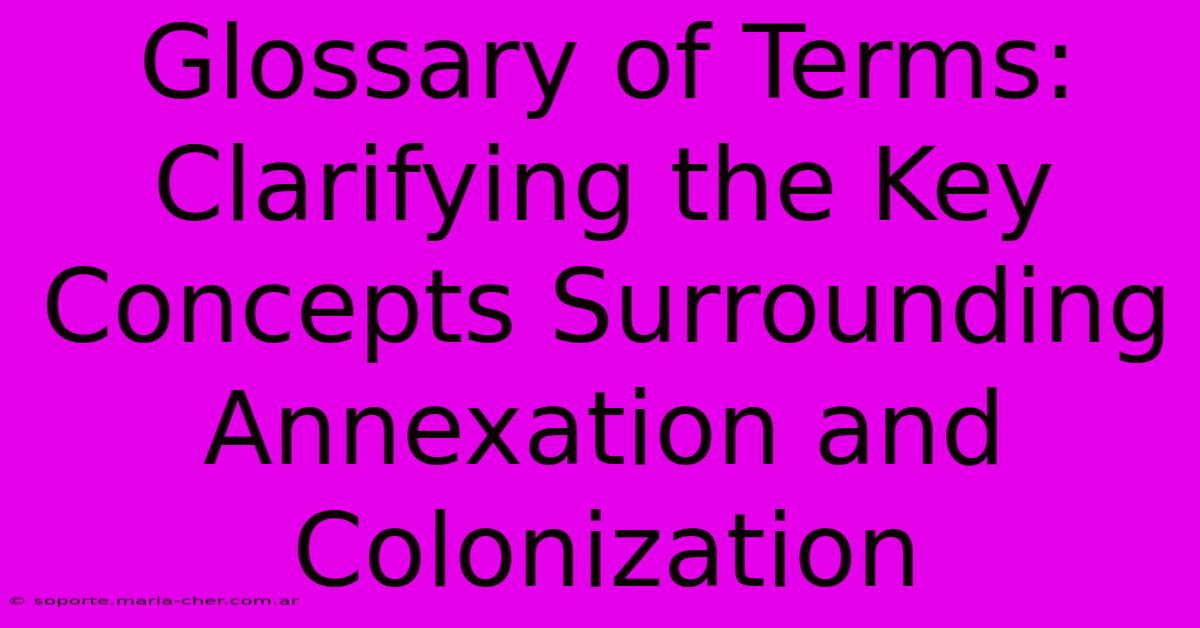Glossary Of Terms: Clarifying The Key Concepts Surrounding Annexation And Colonization

Table of Contents
Glossary of Terms: Clarifying the Key Concepts Surrounding Annexation and Colonization
Understanding the nuances of annexation and colonization requires a clear grasp of the key terms involved. This glossary aims to clarify these concepts, shedding light on their historical and contemporary implications. While often used interchangeably, they represent distinct, albeit related, processes with significant differences in their power dynamics and consequences.
Key Terms Defined
Annexation: The formal act of incorporating a territory into an existing political entity. This often involves the transfer of sovereignty, meaning the annexed territory loses its previous governing authority and becomes subject to the laws and administration of the annexing power. Annexation can be achieved through various means, including conquest, treaty, or purchase. Crucially, annexation doesn't necessarily imply the displacement or subjugation of the existing population, though it often does in practice.
Colonization: A more complex process involving the establishment and maintenance of political, economic, and cultural dominance over a territory and its people by a foreign power. Colonization is characterized by:
- Settlement: The migration of people from the colonizing power to the colonized territory, often leading to significant demographic changes.
- Exploitation: The extraction of resources and labor from the colonized territory for the benefit of the colonizer.
- Subjugation: The suppression of the indigenous population, often through violence, oppression, and the imposition of foreign laws and customs.
- Cultural Imposition: The deliberate attempt to replace the indigenous culture with that of the colonizer.
Sovereignty: The supreme authority within a territory. A sovereign state has the right to govern itself without external interference. In the context of annexation and colonization, the loss of sovereignty is a central feature.
Imperialism: A policy of extending a nation's power and influence through diplomacy or military force. Imperialism is the broader context within which annexation and colonization often occur. It encompasses the ideological and economic motivations driving these processes.
Indigenous Population: The original inhabitants of a territory, often facing displacement, dispossession, and cultural disruption as a result of annexation and colonization.
Colonialism vs. Imperialism: While often used interchangeably, there's a distinction. Imperialism is the overarching policy of expanding influence, while colonialism is one method of achieving imperial ambitions. Colonization involves direct control and settlement, whereas imperialism might be exerted through various means, including economic or political influence without direct territorial control.
Treaty of Cession: A formal agreement where a territory's sovereignty is transferred from one power to another. While seemingly consensual, these treaties are often negotiated under duress or with unequal power dynamics, obscuring the true nature of the transaction.
Decolonization: The process of regaining independence and sovereignty by formerly colonized territories. This process can involve protracted struggles for self-determination and often involves significant social, political, and economic restructuring.
Examples Differentiating Annexation and Colonization
-
The annexation of Texas by the United States: While this involved the incorporation of a territory, it didn't necessarily entail the same level of systematic cultural imposition and exploitation characteristic of colonization. However, it did displace and subjugate the indigenous populations already inhabiting the region.
-
The colonization of India by Great Britain: This involved prolonged occupation, systematic exploitation of resources, and imposition of British culture and governance, leading to profound and lasting effects.
Understanding the Lasting Impacts
The consequences of annexation and colonization are far-reaching and continue to shape the political, economic, and social landscapes of many regions today. Understanding these terms and their implications is vital for critically analyzing historical events and contemporary geopolitical dynamics. The legacy of these processes continues to fuel ongoing discussions around issues of reparations, self-determination, and social justice. By understanding the differences and overlaps between these concepts, we can engage in more nuanced and informed discussions about power, sovereignty, and the shaping of nations.

Thank you for visiting our website wich cover about Glossary Of Terms: Clarifying The Key Concepts Surrounding Annexation And Colonization. We hope the information provided has been useful to you. Feel free to contact us if you have any questions or need further assistance. See you next time and dont miss to bookmark.
Featured Posts
-
Hidden Alchemy Uncovering The Metaphorical Magic Of Options Trading
Feb 04, 2025
-
Transform Gmail Into A Hipaa Compliance Fortress Easy As Pie
Feb 04, 2025
-
The Winters Kiss Uncover The Beauty Of Christmas Azaleas
Feb 04, 2025
-
Unlock Your Career Potential Join The Elite Team At Perry Homes Today
Feb 04, 2025
-
Transform Your Table Into A Work Of Art Discover The Magic Of Custom Table Runners
Feb 04, 2025
